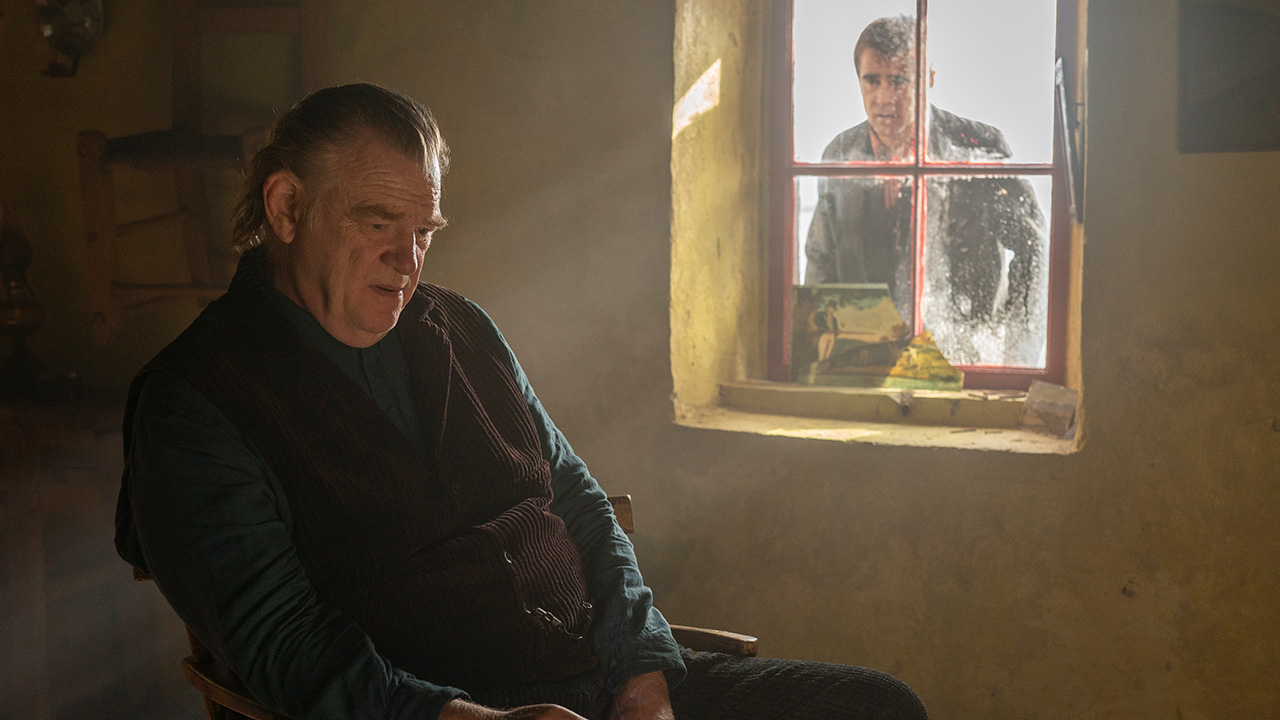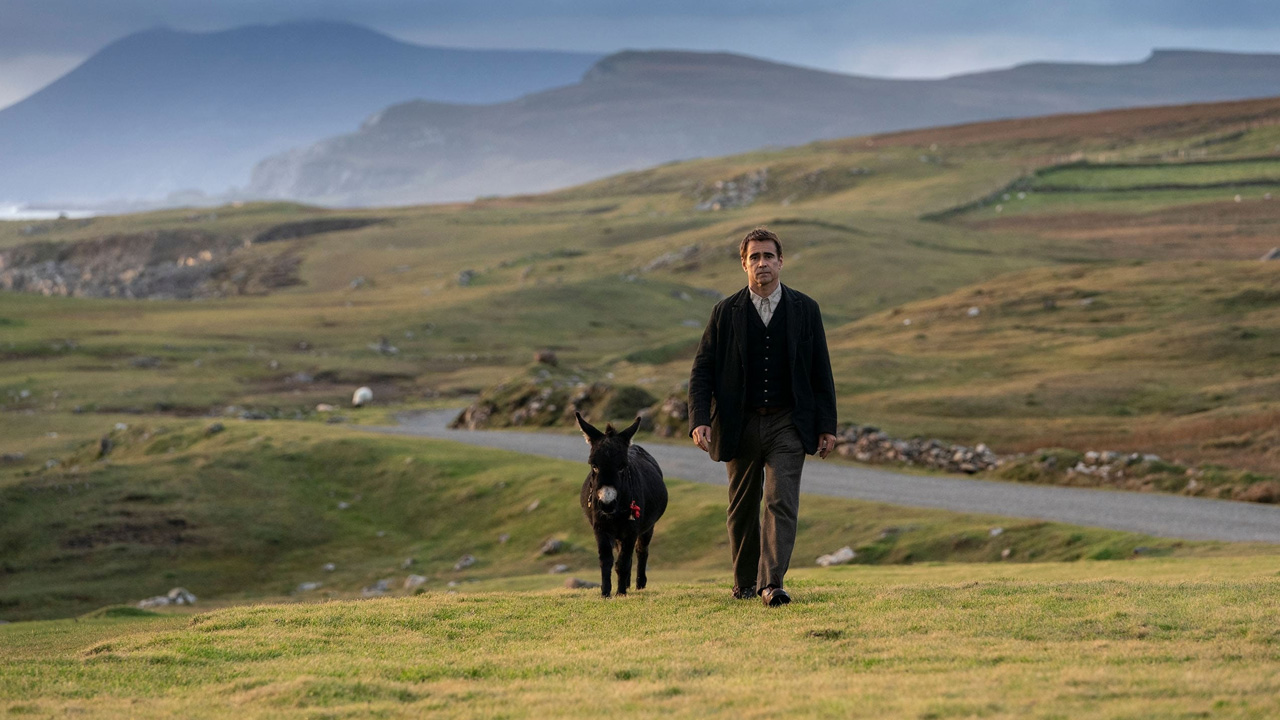The Banshees of Inisherin is an affectionate buddy comedy centred on a bleak idea
Colin Farrell and Brendan Gleeson are a double-act for the ages.

Brendan Gleeson and Colin Farrell reunite with writer-director Martin McDonagh for The Banshees of Inisherin, a dark buddy comedy following a pair of lifelong friends on a remote Irish island who find themselves at an awkward time in their relationship when one of them no longer wants to be friends. Bleak but affectionate, Rory Doherty says it feels like a return to In Bruges.
At the centre of The Banshees of Inisherin, the latest black comedy from Irish playwright Martin McDonagh, there exists a pitiful, pathetic, and utterly perplexed man. Pádraic (Colin Farrell) lives as simple a life as you can imagine, a dairy farmer on an isolated island off the west coast of Ireland. The population is minimal, and there’s even less to do; save for tending to his donkey Jenny and whiling away time at the one pub with his drinking buddy Colm (Brendan Gleeson). We’re not witness to any of these happy meetings, as Banshees kicks off with a seismic inciting incident—Colm, with little explanation, calls off their friendship entirely.
This change triggers a lot of panic from Pádraic, such a blow to the homosocial equilibrium has a deadening effect on his male fragility. There was one constant in his life, one surety he could set his watch to, and now overnight his personality has been grievously indicted. How long has Colm been judging him unfavourably like this? Is it something other people have noticed and thought about him too? But while Colm doesn’t feel motivated to thoroughly and fairly explain the change in his temperament, Pádraic lacks the skills to articulate the barest of emotional turmoil, and so bitterness is sewn between the men, soon to grow into something vile and dangerous. In all its thorniness, Banshees is still McDonagh’s most muted film so far; the broadness of the rural Irish tongue is explored to new extremes, with McDonagh masterfully weaponizing cadence and lexicon to dismantle a whole community off the back of one clumsy act of hostility.
I’ve always found a lot to love about McDonagh’s film and theatre work, but apart from In Bruges, I haven’t seen anything from him that doesn’t have a slight messy feel to it; it’s often a touch overwritten, and the insistence on his wordy humour can lag the pace of some scenes. These are minor complaints, and ones even less significant in the case of Banshees, which feels like a return to In Bruges with its quiet philosophising amongst loud banter, as well as using the same two stars.
In Farrell and Gleeson, McDonagh has truly found a double-act for the ages. The anxious keenness of Pádraic clashes perfectly with the gloomy sourness of Colm, like two different types of over-excited and pouting dogs, one yapping incessantly, the other always trying to self-induce sleep. Their mannerisms and affectations become reflexively familiar over the course of the film, each of them covering the well of discomfort both men feel about talking honestly, for fear of making themselves too vulnerable. It’s a conflict for which there is no solution discovered by the tiny 1920s Irish community, and even as it escalates to ugly and violent extremes, you can see the tiny steps each makes to spin it all out of control. It’s a community so small, each one of these tiny steps has a rippling effect on those who live there, treading on insecurities and confirming their prejudices.

Colm, as it turns out, has a valid explanation for his recent disavowal of Pádraic, and it’s not solely finding him dull. McDonagh’s script treatment on mental illness feels delicate and affecting, brought to growling life by Gleeson’s often silent performance, and considering this crucial aspect to his character, you get an insight into even his most self-destructive actions. These are extreme ends the pair eventually find themselves in—it could even be argued they find them somewhat cathartic after years of no true empathetic connection—but they’re not entirely responsible for finding themselves in them.
The fictional island of Inisherin makes a picturesque setting for the film, despite an overindulgence in drone shots that cheapen the otherwise robust cinematography from Ben Davis. Hanging in the background, or more specifically, hanging easterly on the mainland, we see glimpses of the Irish Civil War. There’s clear parallels (maybe too clearly spelled out for some) between the two hostilities in Banshees—how senseless the disagreements are, how irreparable the violence is. But Banshees’ greatest resonance is grounded in its interpersonal themes; in a time where “niceness” is the champion of film and TV, celebrated by audiences and awards bodies (see CODA, Abbott Elementary, Ted Lasso, or Everything Everywhere All At Once), McDonagh, as always, seems more interested in interrogating such social qualities than simply portraying them.
In Pádraic, we have a character whose niceness feels like a limitation, perhaps it even makes him boring. But on the other hand, there seems to be in Banshees a deeper, more uncomfortable reflection; we are an inherently cruel species, and must make the effort to project kindness lest we fall to our fundamentally harmful behaviour. It’s a bleak idea, but it makes the film’s displays of genuine geniality and friendship feel a lot more earned. Come for the grumpy Irish men, stay for the gentle explorations of masculinity—or because it’s the polite thing to do.
























